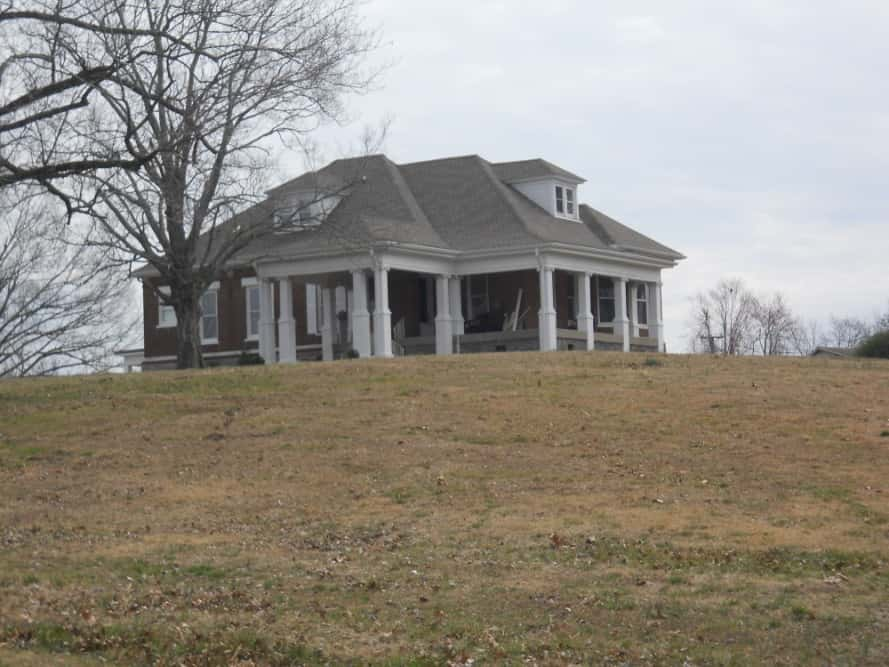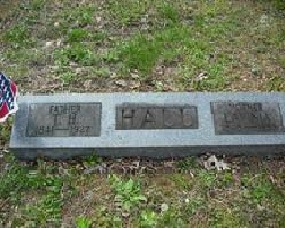Lieutenant Turner Harrison Hall
Written by Justin D. Lamb

The Dycus House was the home of Turner Harrison Hall’s daughter, Mary Bethel Dycus and her husband Senator Walter Dycus. Turner Harrison Hall would hold unofficial Confederate veteran reunions on the front porch of the home in the early 1900s.
(Collection of the author)
Turner Harrison Hall was the eldest child born in 1841 to John and Rebecca Harrison Hall in Montgomery County, North Carolina. When Hall was six years old his family moved to Kentucky where they settled in the Symsonia area of Graves County. His family farmed a small lot in the Graves County area and Hall grew up very poor and working strenuous days on the family farm.
At the break out of the War Between the States in 1861, Hall threw his allegiance with the Southern Cause and he walked 100 miles to Clarksville, Tennessee to enlist in the 3rd Kentucky Mounted Infantry, Company G at Camp Boone. Hall mustered in as a Private on July 11, 1861 under the command of General Lloyd Tilghman of Paducah. According to his enlistment papers, Hall stood at 5’7”, light hair, and blue eyes.
The 3rd Kentucky took part in the Battle of Shiloh on April 6-7, 1862 where they lost 172 men and all regimental officers were wounded or killed. Hall along with his regiment remained at Port Hudson, Louisiana under the command of the Army of Tennessee before being ordered to Tullahoma, Tennessee to reinforce Lt. General John Pemberton in the defense of Vicksburg. On June 14, 1863, Hall was reported as “deserted or missing” in Vernon, Mississippi, but later returned to duty in October 1863.
The regiment’s strength was severely depleted by 1864 and was ordered to report to General Nathan Bedford Forrest. “Horses were unavailable, so the men followed Forrest on foot. The Kentucky troops that accompanied Forrest were divided into four brigades. The 3rd Kentucky Infantry was in the third brigade with the 7th Kentucky Infantry, and 8th Kentucky Infantry, commanded by Colonel A. P. Thompson.”
On March 15, 1864 Forrest moved north toward Paducah, Kentucky and Hall was made Second Lieutenant in the 3rd Kentucky. Three miles from Paducah, Forrest and his troops encountered Union troops and pushed them back to their camp on the outskirts of town. “Under fire from a nearby fort, the Kentuckians moved through the streets of Paducah. The fort was discovered to be impenetrable, and a retreat was ordered. Colonel Thompson was killed by cannon fire while leading his troops.”
Forrest and his troops soon returned to Mississippi where the regiment was engaged at the Battle of Brice’s Crossroads, and Hall was wounded in the shoulder on June 10, 1864 at the Battle of Tishomingo Creek. Following the Battle of Franklin, Tennessee, Hall along with his younger brother, Pvt. John Daniel Hall, was captured on December 17, 1864. The two brothers were separated with the oldest being sent to Fort Delaware in Pea Patch Island while the younger was shipped to Camp Chase in Ohio. By May 1865 with Union forces enclosing in on the Confederate capital of Richmond, Hall learned the tragic news of his younger brother’s death in the Yankee prisoner camp in Franklin, Ohio. A month later with the war finally over, Hall was released and returned to Kentucky to find his place as an unreconstructed Rebel in the now Reconstructed South.
Hall returned to civilian life and was appointed deputy sheriff in Graves County and served three years. He married in 1872 to Lavinia Ferrell, daughter of Drewry A. Ferrell and Mary B. Ferrell. In 1882, Hall moved his family to Oak Level in Marshall County where he opened a very successful mercantile business and tobacco warehouse.

Turner Harrison Hall’s grave in Symsonia.
(Find a Grave Website)
His daughter, Mary Bethel Hall, married local attorney Walter Dycus on April 21, 1898. Walter Dycus later became State Representative and State Senator for Marshall County. Senator Dycus began construction on a new home for his bride in 1907 on the Jefferson Davis Highway (now KY 408). “Crestcote,” as the home was called, was “a handsome two story brick home equipped with electricity, water, heating, and all other luxuries of the time.” Local oral history dictates that on the front porch of the Dycus home, Hall and other Confederate veterans would gather periodically for unofficial veteran reunions to swap stories and recall the war days.
Turner Harrison Hall passed away in 1927 at Oak Level. He was buried in the Old Sandhill Cemetery in Graves County.
